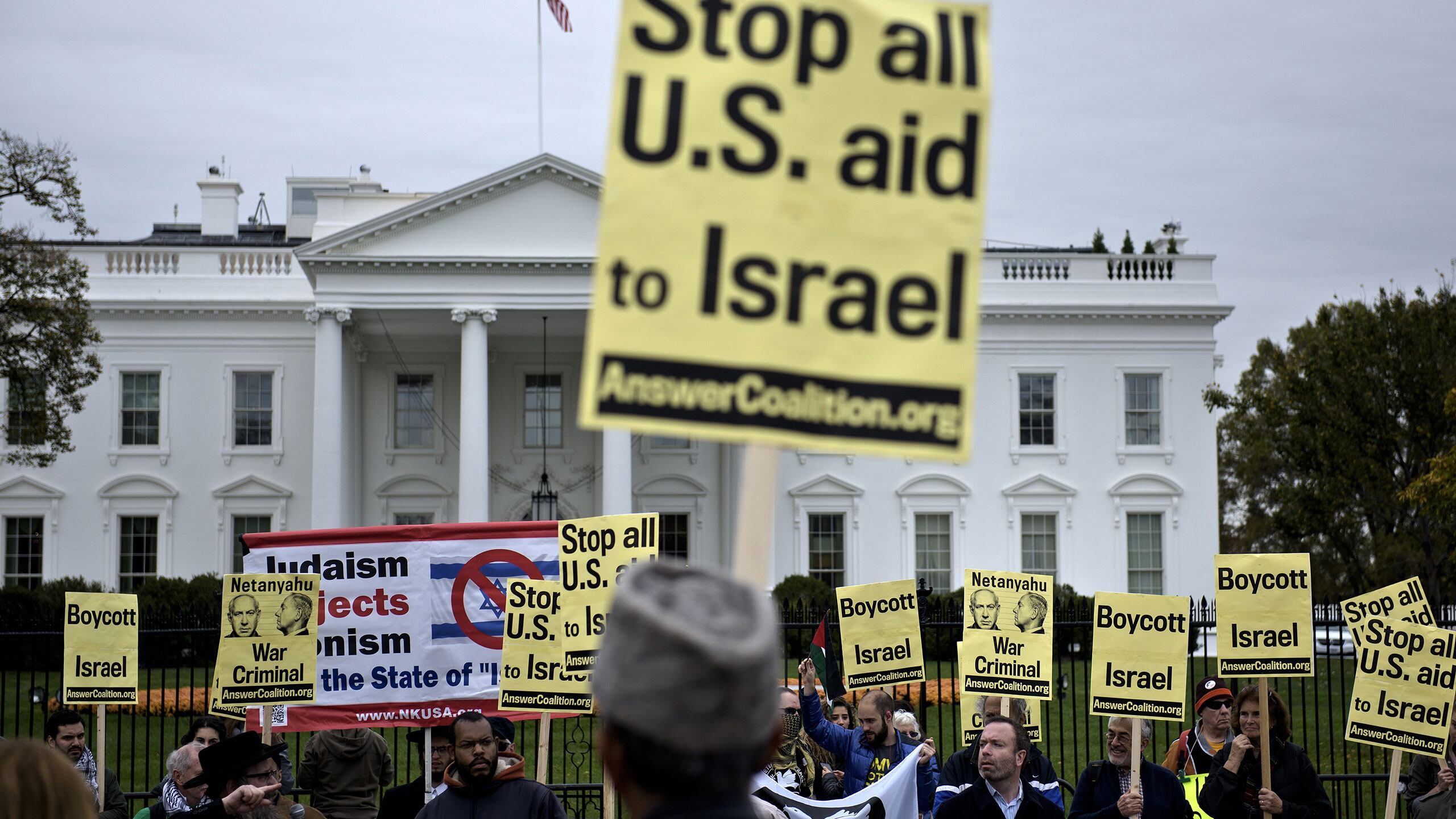Some progressives are up in arms about a new law that would make it a crime to boycott Israel. Trouble is, there's no such thing.
On Monday, the American Civil Liberties Union released a letter urging members of Congress to oppose the “Israel Anti-Boycott Act,” which, the ACLU said, “would punish individuals for no reason other than their political beliefs.” Not only would this law criminalize participation in a boycott of Israel – such as that urged by the Boycott, Divestment, Sanctions (BDS) movement – but it would even criminalize “simply requesting information about such boycotts.”
Several condemnations followed. Glenn Greenwald, for example, said Wednesday at The Intercept that Congress was set to “Criminally Outlaw Support for Boycott Campaign Against Israel.” Greenwald went on to excoriate several members of Congress for failing to immediately oppose the bill immediately.
ADVERTISEMENT
To be honest, I was all set to oppose the law myself, until I actually read it. Turns out, all of this is wrong. The ACLU misread the law, and Greenwald misread it even worse.
But they're not the only ones. Backers of the law have also misrepresented what it does, and exaggerated the threats it supposedly addresses. In other words, everyone is yelling and no one is making any sense.
Let’s start at the beginning, which in this case is 1977. In the throes of the Arab boycott of Israel, Congress passed the Export Administration Act, which made it a crime to participate in that boycott, or, for good measure, any other foreign-led boycott of a U.S. ally. This law is still in effect today, having been reauthorized several times. Take a look at the website of the Office of Antiboycott Compliance, which explains it to you in detail.
As the OAC explains, while the law addresses all “U.S. persons,” it is actually about corporations, which are forbidden from joining the boycott, or cooperating with the boycotters by furnishing them any information. Exceptions are provided for companies that are effectively forced to cooperate to avoid the “secondary boycott” of countries who do business with Israel.
To repeat, this is the law today. It is against the law to join in a boycott of Israel led by a foreign country. Companies may be fined up to $50,000 or five times the amount of the contested transaction (whichever is greater), and executives can be sent to prison for five years.
Flash forward to 2016, when the United Nations Human Rights Council passed four resolutions regarding Gaza and the West Bank (including East Jerusalem). It called for companies to “avoid, identify, assess and address any adverse human rights impacts related to their activities,” affirmed the two-state solution, called for an end to Israeli settlements in the West Bank, and, being a UN agency after all, requested additional reporting and consideration.
This, cried AIPAC and other pro-Israel organizations, was a call to boycott Israel. Clearly it wasn’t – but that didn't matter. Earlier this year, a handful of members of Congress introduced the “Israel Anti-Boycott Act, which states, among other things, that “the UNHRC targeted Israel with a commercial boycott.”
In response, the bill would include any UN-led boycott within the 1977 law. Never mind that there are no UN-led boycotts; for members of Congress seeking to appear “pro-Israel,” striking back at a fictional one is sufficient.
That is, I promise, all the new law does: extend the 1977 law to UN boycotts as well as governmental ones. (If you don’t take my word for it, read it yourself.) Does it really “punish the exercise of Constitutional rights? Not any more than the 1977 law does, and it’s been in effect for 40 years.
And of course, that law is only enforced against corporations, not individuals attending a BDS rally or declining to buy Sabra hummus. It’s the Department of Commerce, after all. They don’t care about your personal SodaStream, or lack thereof.
The Daily Beast asked the ACLU about the discrepancies between their letter and what the bill actually says. In response, Brian Hauss, staff attorney with the ACLU’s Speech, Privacy, and Technology Project, said that “the right to engage in a peaceful political boycott is squarely protected by the First Amendment, and a proud part of America’s constitutional legacy. Whatever Congress thinks about boycotts targeting Israel, it should reject any attempt to expand the scope of criminal laws targeting peaceful political activity.”
That's a lot more nuanced than what pundits have been howling about these last few days, and it suggests that perhaps the ACLU is rethinking its position. But, to be fair, before the Left got this bill wrong, the Right got it more wrong. AIPAC, for example, heralded the law as a major legislative priority, saying it would “prohibit U.S. persons from cooperating with efforts by international organizations – including the U.N. – to boycott Israel.”
That is, at best, disingenuous. Really, the only thing the law does is add that em-dashed phrase “including the U.N.” But by trumpeting the law as a big deal, AIPAC gets to claim credit for a big win when it passes – which perhaps makes up for their colossal, humiliating, and totally preventable loss in opposing the Iran Deal last year. Like the members of Congress who are backing the bill, AIPAC is backing it to pander to its constituents.
Trouble is, the ACLU took AIPAC at its word – and topped off its laziness with incompetence, misreading the statutory provision about “requesting information about such boycotts.” Not to get in the weeds here, but that is flat wrong. Section 4(b)(C) of the bill inserts the words “or requesting the furnishing of information” into the part of the 1977 law that forbids companies from furnishing information about its business activities to boycotting entities.
In other words, it doesn’t penalize requesting general information about a boycott. It penalizes asking the UN for information about the specific business activities of others. That provision is still problematic, but it is not at all what the ACLU or Greenwald — who didn’t respond to a request for comment — says it is.
In other words, everyone is wrong: the ACLU, Greenwald, AIPAC and the bill’s sponsors. The actual bill is a nothingburger that fights an imaginary boycott – which is exactly why its cosponsors said things to Greenwald like “we have a different read of the specific bill language” and “this is the first time I have seen this issue raised.” They thought this was yet another meaningless pander to the Israel-First crowd – and they were right.
Zooming back, of course, this bill is indeed part of a troubling move to stigmatize the BDS movement, which at its heart is a campaign of non-violent resistance – though depending on who you talk to, that resistance is either against the brutal, half-century military occupation of the West Bank, or against the state of Israel itself.
Indeed, the BDS movement is highly disingenuous about this very ambiguity, refusing to define exactly what it is for and what it’s against. Is the BDS movement against Israel’s occupation, or against Israel’s existence? Is it for two states, or one state? By refusing to clarify its aims, refusing to condemn terrorism, and refusing to silence the anti-Semites within its ranks, the BDS movement has left itself open to the right-wing charge that its anti-Zionism is merely repackaged anti-Semitism.
Based on ten years of firsthand experience, I’d say that charge is roughly 95% false. But the inability of BDS supporters to call out the remaining 5% corrupts the entire enterprise and provides fodder for endless hysterical right-wing rants about anti-Semitism on college campuses, pride marches, and UN meetings. The Israel Anti-Boycott Act is partly based on that false equivalence – that anti-Zionism is anti-Semitism – and partly based on the justified fear that Israel’s narrative is not convincing anyone anymore. With the failure of moderate efforts (the two-state solution, the Oslo process), the only thing left are the extremes: anti-Israel BDS on one side, Israeli nationalist policies on the other.
So, in a way, the Israel Anti-Boycott Act, and the ACLU’s opposition to it, are each a perfect response to the conversation about the BDS movement itself: confusing, pandering, and above all, angry.






